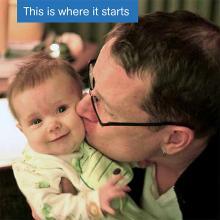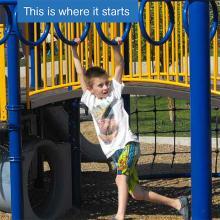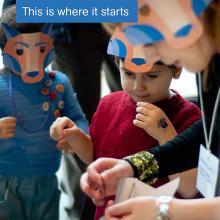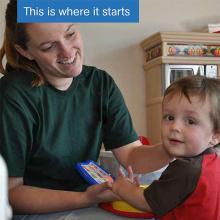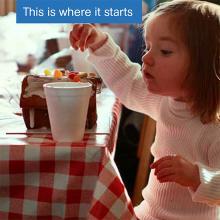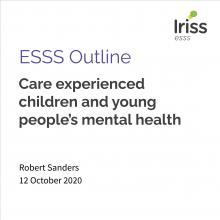This case study is part of This is Where it Starts, a collection of eight case studies on work with children and parents in early years.
Background
The family centre supports up to 100 families through a multi-disciplinary team that provides nursery education and daycare, outreach work, family work, group work and individual work. The nursery places are for children up to the age of three years and offer an extended day and all-year-round provision.
Family support services provided at the centre offer both open access to families in the local community and to families with additional needs in the Glasgow East Community and Health Care Partnership area who are referred by statutory and third sector agencies.
The centre works with a diverse range of families including those affected by substance misuse, unemployment, mental health problems, multiple deprivation and poverty.
Funding
- Mainly from Glasgow City Council (education and social work departments) and Scottish Government's Early Years Action Fund with additional grants from a range of other funders including Cattanach, Volant, Postcode Trust, Community Health and Food Initiative, and Cash for Kids.
Size and number of staff
- Supports up to 100 families
- 8.5 early years practitioners in the nursery, 3.5 project workers delivering family support, 1.5 admin staff, one caretaker, one service co-ordinator and a nursery manager
Referral routes
- self-referral, statutory and third sector agencies, health, education
Key partners
Education, social work and health
Established
June 2000
Key Messages
Links between home and nursery are vital
An important element of the work of the family centre is based on the links it forges between the centre and the home. Home visits are vital outreach for the centre and enable it to 'get into the heart of the community'. Home visits provide a number of opportunities including:
- Children have a familiar face between the centre and the home which supports them to settle into the nursery.
- Practitioners gain a better understanding of the home environment. In some instances, by attending home visits centre practitioners have been able to help families secure funding for white goods.
- Practitioners can meet with extended family members such as grandparents who are part of the child's life and provide care to the child.
- Home visits give practitioners an opportunity to encourage families to attend the centre and dispel any misconceptions about ways to access support of the centre (for example, if parents think that support is only accessible through referrals from statutory social work).
- Practitioners can identify if some family members need more support to access the centre. For example, where some families were very new to the area (including asylum seekers and refugees), and didn't know their way around the local area, centre staff would offer to accompany them from home to the centre. Staff are also able to identify language barriers and then provide additional support at the centre including interpreters.
- Ultimately, home links help the development of trusting relationships between the centre practitioners, families and children. They also help promote a more holistic, person-centred model of support which doesn't focus exclusively on the location of the service and appreciates that the home.
Integrate groups of practitioners
Group work which is delivered to parents jointly by early years practitioners and support workers is seen as particularly effective. It provides a way for early years practitioners to share particular expertise around, for example, child development. The centre also draws on the expertise of workers outside their professional roles: for example their admin worker enjoys cooking and so volunteered to run a healthy food group for parents.
Peer support is important
Parents provide invaluable peer support to other parents. The centre has found that word of mouth between parents has been an effective way of engaging with other parents in the community. Practitioners notice that parents demonstrate a real sense of ownership of the centre, for example by showing new parents around.
Be a hub for other services
In order to build the capacity of individual parents, the centre routinely hosts learning and development initiatives. These are delivered either by branches of Quarriers or other organisations such as Parent Network Scotland to help parents with challenges around employability, managing money, confidence building, and accessing benefits. Taking this further, the centre recognises the potential to act as a hub for health visitor appointments including antenatal check-ups.
Have an open door (and an open kitchen)
The centre has an open door policy whereby any parent from the community is welcome to attend with their child to use the facilities. The centre employs a drop-in worker, a friendly face who meets and greets all parents, whether they are new or familiar to the centre which sets a welcoming tone. Making a kitchen available for parents has proved to be an effective way of engaging them as it provides a safe space to relax, eat and connect with other parents and workers. Practitioners suggest that for some parents affected by drug and alcohol misuse, they need safe and healthy environments to spend their time in and the centre kitchen provides this, and it also helps address social isolation experienced by many parents. It also means parents using the kitchen facilities can save a little on their own utility bills, often a concern for families living in poverty.
Be a role model for healthy attachment
Research tells us how important healthy attachment is for children. Where attachment is absent or disorganised, this can have long lasting consequences for children and can lead to negative outcomes in later life. Centre managers recognise that some of the parents they support have not experienced healthy attachments in their lives and for some parents the relationship with the centre is the only positive, stable one they have. The centre plays an important role in providing a model of healthy attachment by building positive, trusting relationships with parents which they can hopefully model with their children. As one manager put it 'the centre is a bit like an extended family', providing much needed support to vulnerable families.
'Widen understanding of what learning is'
Practitioners recognise the importance of providing an environment which promotes learning for children but also, importantly, to their parents. Centre workers routinely invite parents to join in play activities at the nursery. They recognise that some parents have had negative experiences of education and school, which may have led to negative ideas about the concept of learning. The centre aims to 'widen people's understanding of what learning is' by involving parents in play and learning activities. This not only shows parents how to play with their children but also gives them ideas for things to do with their children at home, such as making play dough and playing with bubbles.
Further information
Further details about the Quarriers Ruchazie Family Centre

